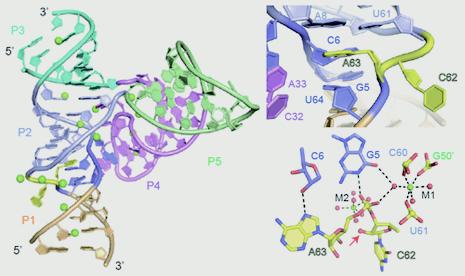Dr. Aiming Ren’s group published a research article online in Nature Communications entitled "Structure-based Insights into Self-Cleavage by a Four-way Junctional Twister-Sister Ribozyme".
Here we report on the crystal structure and cleavage assays of a four-way junctional twister-sister self-cleaving ribozyme. Notably, eleven conserved spatially separated loop nucleotides are brought into close proximity at the ribozyme core through long-range interactions mediated by hydrated Mg2+ cations. The C62-A63 step at the cleavage site adopts a splayed-apart orientation, with flexible C62 directed outwards, while A63 is directed inwards and anchored by stacking and hydrogen-bonding interactions. Structure-guided studies of key base, sugar and phosphate mutations in the twister sister ribozyme, suggest contributions to cleavage chemistry from interactions between a guanine at the active site and the non-bridging oxygen of the scissile phosphate, a feature found previously also for the related twister ribozyme. Our four-way junctional pre-catalytic structure differs significantly in the alignment at the cleavage step (splayed apart versus base-stacked) and surrounding residues and hydrated Mg2+ ions relative to a reported three-way junctional pre-catalytic structure of the twister-sister ribozyme.

Tertiary Structure of Intermolecular Contacts and Bound
the Twister-sister Ribozyme Mg2+ Ions at the C62-A63 Cleavage Site
in the Structure of the Twister-sister Ribozyme
Link: https://www.nature.com/articles/s41467-017-01276-y



